Large shareholdings in Marks and Spencer, Apple and Google helped the Wellcome Trust to an enviable 18 per cent return on its investment portfolio in the year to the end of September.
The Trust, which is the tenth-biggest charity in the UK by income according to this year’s Charity 100 Index but boasts the largest endowment, posted returns of over £2.6bn on its assets worth £14.5bn at the start of the year.
Its public and private equity holdings, venture capital funds, hedge funds and residential property interests all recorded gains of 15 to 20 per cent.
Returns in the five years since September 2008 have exceeded £7bn, or a cumulative 57 per cent, and an average of 10 per cent each year since 1995. The results have prompted commentators such as the Evening Standard’s City editor Anthony Hilton to wonder why more pension funds can’t achieve similarly positive returns.
80 per cent in equities
More than 80 per cent of the Trust’s portfolio is concentrated in 42 directly-held public or private assets and in 51 external partnerships, each with a value of over US$100m. Overall exposure to private equity has grown from £2.5bn in September 2008 to £4.8bn now. Its only exclusion is tobacco stocks.
The mainstay of its equity assets is the Mega Cap Basket – 31 holdings in blue-chip companies including M&S, Apple, Google, Roche and Toyota. This Basket was initiated in 2008 and during 2012/13 Wellcome neither sold any of these shares or added new assets to it. The Mega Cap Basket has returned 55 per cent over its lifetime so far and the biggest holding is now M&S, also the highest returner this year at 134 per cent.
The charity has a policy of publicly disclosing its holdings in each company, even where not required to, and actively engaging with company management. “As our tenure on shareholder registers lengthens and our holdings grow, we are achieving greater traction,” it said in its annual report.
The Trust attributes its success to the long-term vision underpinning its investment strategy: “Long-term investors are able both to be counter-cyclical and patient,” it said.
“Market timing is an important tool for us. Having reduced our exposure to public and private equity from 80 per cent in 2005 to 58 per cent in 2008, we used the period between 2008 and 2011, when most investors were highly risk-averse, to restore it to 69 per cent. It has since risen to 74 per cent and, in the past two years, investors have returned to risk assets.
“We have been rewarded for this initially counter-cyclical action as returns have exceeded £7bn (57 per cent) since the beginning of the global financial crisis in September 2008, with five consecutive years of positive performance.”
The Trust’s chief investment officer Danny Truell also eschewed bonds and commodities, and at the margin shifted within equities from faster-growing markets into Japan, where he fully hedged positions against Yen depreciation to enhance returns.
Hedge funds returned 15 per cent even though, at below 12 per cent, their total exposure in the portfolio is at its lowest level since 2005. And property, which is 90 per cent represented by residential interests in London and Germany, maintained average returns at 10 per cent per year over the last ten years.
Record expenditure on charitable activities
The income provided by the portfolio enabled the Trust to commit £726m to grants and charitable activities during the year, mostly in grants to scientists working in medical research, and mostly in the UK.
This was the biggest expenditure on charitable causes to date, up £27m on 2012, and around 40 per cent higher than five years ago. The biggest recipient was Cancer Research UK’s Francis Crick Institute, and Oxford and Cambridge Universities.
During 2013 the Wellcome Trust launched a new scheme called Sustaining Health, to encourage and support research in areas such as the health impacts of climate change, connections between ecology and public health, global nutrition and behaviour change.
“These are relatively new fields of research and bridge previously unconnected disciplines, so once again the Trust is looking to catalyse new initiatives, approaches and collaborations that could help map out routes to a sustainable future,” said the report.
Future prospects
The charity said that going forward, it expects returns to be weaker over the next five years than the last five or ten, but is still predicting “high single-digit returns from equities”.
While it has no pre-set notion of asset allocation, it could expect many of its investments to be related to its long-term investment themes of “ageing demographics, the disruptive knowledge economy, the New New World, and scarcity”.
Over the next five years the Trust aims to commit at least £3.7bn to charitable activities.









